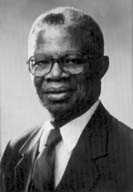Helvécio Martins
| Helvécio Martins | ||
|---|---|---|
 Helvécio Martins in 1990 | ||
| Second Quorum of the Seventy | ||
| 31 March 1990 – 30 September 1995 | ||
| Called by | Ezra Taft Benson | |
| End reason | Honorably released | |
| Personal details | ||
| Born |
27 July 1930 Rio de Janeiro, Brazil | |
| Died |
14 May 2005 (aged 74) Santo André, São Paulo, Brazil | |
| Spouse | Rudá Tourinho de Assis | |
| Children | 4 | |
|
| ||
Helvécio Martins (27 July 1930 – 14 May 2005) was the first person of Black African descent to be called as a general authority of The Church of Jesus Christ of Latter-day Saints (LDS Church).
Born to descendants of African slaves in Rio de Janeiro, Brazil, Martins joined the LDS Church in 1972, despite his knowledge that the LDS Church did not then allow members of Black African descent to hold the priesthood or to receive temple ordinances.
On 9 June 1978, Martins and his family heard of the announcement that the LDS Church was lifting the priesthood ban. After Martins received the priesthood and his temple ordinances, he served in the LDS Church as a bishop, counselor to a stake president, and as president for the Brazil Fortaleza Mission.
In April 1990, church president Ezra Taft Benson called Martins as a member of the Second Quorum of the Seventy. Martins became the first black general authority in LDS Church history.
After serving a standard five-year term as a member of the Second Quorum of the Seventy, Martins was honorably released as a general authority on 30 September 1995. He died in Santo André, São Paulo, Brazil at age 74.
Martins dictated his life story which was published as The Autobiography of Elder Helvecio Martins.[1]
Martins' son, Marcus, is a former chair of the religion department at Brigham Young University–Hawaii.
See also
- 1978 Revelation on Priesthood
- Blacks and The Church of Jesus Christ of Latter-day Saints
- Joseph W. Sitati
Notes
- ↑ Helvecio Martins and Mark Grover, The Autobiography of Elder Helvecio Martins (Aspen Books, 1994, ISBN 1-56236-218-6).
References
- "Elder Helvécio Martins of the Seventy", Ensign, May 1990, p. 106.
External links
|